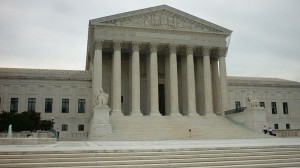 WASHINGTON — While the U.S. Supreme Court is expected to issue a ruling any day regarding states’ rights surrounding same-sex “marriage,” its nine justices are also considering whether to agree to hear an appeal of a federal decision that might close most abortion facilities in Texas.
WASHINGTON — While the U.S. Supreme Court is expected to issue a ruling any day regarding states’ rights surrounding same-sex “marriage,” its nine justices are also considering whether to agree to hear an appeal of a federal decision that might close most abortion facilities in Texas.
As previously reported, in 2013, following the passage of several safety regulations for abortion facilities, Planned Parenthood and other abortion advocacy groups filed a lawsuit, stating that they would have an adverse affect on most facilities in the state.
A federal judge appointed by then-President George H.W. Bush soon placed an injunction on portions of the new law, including the requirement that abortionists have admitting privileges at a hospital within 30 miles of the facility, and that facilities be held to the same standards as surgical facilities. District Judge Lee Yeakel declared the regulations an “undue burden” on a woman’s ability to have an abortion.
But as Texas Attorney General Greg Abbott appealed the injunction to the 5th Circuit Court of Appeals, the three-judge panel disagreed with Yeakel that the admitting privileges requirement served no purpose. It stated that although the law would make it more difficult for women to obtain an abortion, the consequence was merely an “incidental effect,” and was “not designed to strike at the right [to abortion] itself.”
The matter was then appealed to the U.S. Supreme Court, which placed a stay on the regulation, holding it until the Fifth Circuit was able to rule on the merits of the law in light of the U.S. Constitution.
The three-judge panel issued its final ruling on June 9, declaring that the regulations withstand constitutional scrutiny because they serve a valid purpose in protecting women’s health and do not burden a “large fraction” of Texas residents. It allowed the law to stand across the state, but made an exception for an abortion facility in McAllen, stating that it would place too much of a burden on abortion-minded women if the location closed.
“[T]he State truly intends that women only receive an abortion in facilities that can provide the highest quality of care and safety—the stated legitimate purpose of H.B. 2,” the court wrote. “Plaintiffs bore the burden of proving that H.B. 2 was enacted with an improper purpose. … They failed to proffer competent evidence contradicting the legislature’s statement of a legitimate purpose for H.B. 2.”
On Friday, abortion advocates appealed the ruling back to the U.S. Supreme Court, which must now decide whether it will hear the case or let the Fifth Circuit ruling stand.
“Not since before Roe v. Wade has a law or court decision had the potential to devastate access to reproductive health care on such a sweeping scale,” Nancy Northrop, president of the Center for Reproductive Rights told the Associated Press. “We now look to the Justices to stop the sham laws that are shutting clinics down and placing countless women at risk of serious harm.”
“The likelihood of this case getting to the Supreme Court is very high and I think that’s a good thing,” commented Mike Norton, senior counsel for Alliance Defending Freedom (ADF), a nationally-recognized Christian legal organization.
The regulations are set to officially take effect on July 1.
Become a Christian News Network Supporter...


